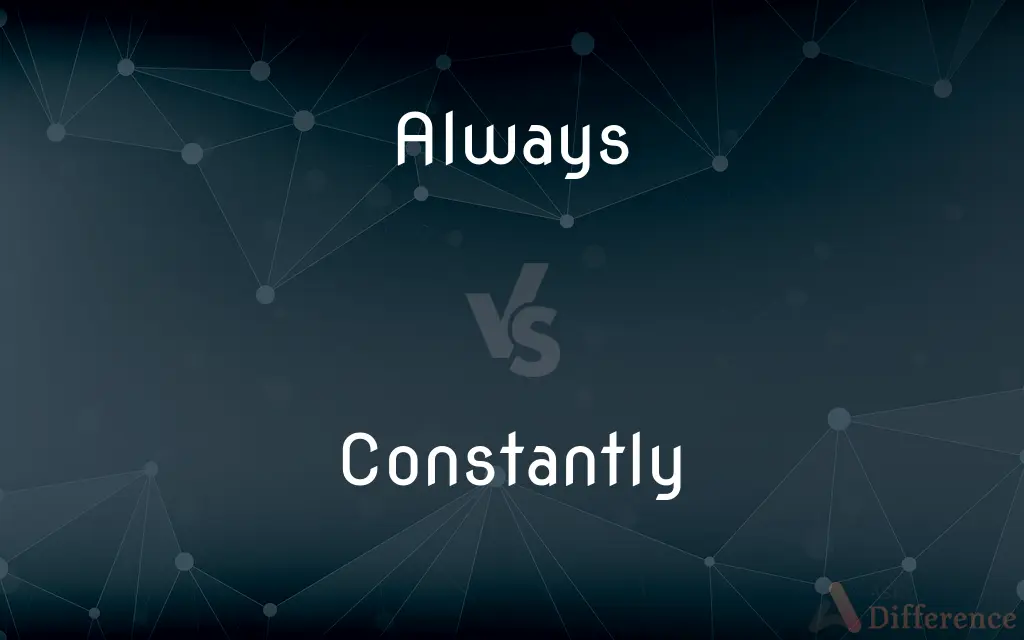Always vs. Constantly — What's the Difference?
By Fiza Rafique & Maham Liaqat — Updated on April 15, 2024
"Always" implies something done without exception, at all times, while "constantly" suggests frequent, continuous action but not necessarily without interruption.

Difference Between Always and Constantly
Table of Contents
ADVERTISEMENT
Key Differences
"Always" is used to describe an action or condition that is true at all times, without exception. For example, the sun always rises in the east. On the other hand, "constantly" implies a high frequency or repetition in actions, often to the point of annoyance, like someone constantly tapping their foot.
In terms of permanence, "always" suggests a fixed, unchanging state. It's often used in contexts that describe universal truths or habits. Whereas, "constantly" can suggest a dynamic, ongoing process, such as constantly evolving technology.
Emotional connotations differ as well; "always" often carries a more neutral or sometimes positive tone, especially in affirmations of loyalty or truth, like "I will always love you." Conversely, "constantly" can carry a negative connotation, especially if referring to bothersome actions or behaviors.
In literary and rhetorical contexts, "always" can be a tool to emphasize eternity or steadfastness. In contrast, "constantly" is used to stress the unrelenting or irritating nature of an action, enhancing its vividness.
When it comes to advice or instructions, "always" is definitive, suggesting something that should never be deviated from, like "Always check your mirrors before driving." "Constantly," however, suggests something that might need continuous attention, like "Constantly monitor the temperature."
ADVERTISEMENT
Comparison Chart
Frequency
At all times, without exception
Very frequently, often continuously
Connotation
Often neutral or positive
Often negative or neutral
Usage in Speech
Universal truths, fixed habits
Ongoing actions, frequent changes
Emotional Tone
Steadfast, eternal
Annoying, persistent
Example Context
"I always brush my teeth at night."
"He's constantly changing his mind."
Compare with Definitions
Always
Forever, without change.
I will always remember this day.
Constantly
Frequently, repeatedly.
She constantly forgets her keys.
Always
Without exception.
He's always been kind to us.
Constantly
Persistently.
He's constantly striving for perfection.
Always
At all times; invariably.
She always arrives early.
Constantly
Without pause.
The fan has been running constantly.
Always
As a last resort.
If all else fails, I always have a backup plan.
Constantly
Continuously over a period of time.
He constantly checks his phone.
Always
Continually.
She is always smiling.
Constantly
Habitually, as a character trait.
They are constantly late to meetings.
Always
At all times; on all occasions
The sun always rises in the east
Constantly
Not changing or varying; continuous
A constant gentle rain.
Drove at a constant speed.
Always
As a last resort; failing all else
If the marriage doesn't work out, we can always get divorced
Constantly
Happening regularly or repeatedly; continual
The constant barking of the dog next door.
Constant interruptions.
Always
At all times; invariably
Always late.
Constantly
Unchanging in nature, value, or extent; invariable
A constant wind speed.
Always
For all time; forever
They will always be friends.
Constantly
Steadfast in purpose, loyalty, or affection; faithful
A constant friend.
Always
At any time; in any event
You can always resign if you're unhappy.
Constantly
Something that is unchanging or invariable.
Always
At all times; throughout all time; since the beginning.
God is always the same.
Green has always been my favorite color. I’ve loved it for as long as I can remember.
Airplanes did not always exist as a form of transportation.
Constantly
A quantity assumed to have a fixed value in a specified mathematical context.
Always
Constantly during a certain period, or regularly at stated intervals (opposed to sometimes or occasionally).
In this street, the shops always close during lunchtime.
Constantly
An experimental or theoretical condition, factor, or quantity that does not vary or that is regarded as invariant in specified circumstances.
Always
(informal) In any event.
I thought I could always go back to work.
Constantly
(archaic) With steadfastness; with resolve; in loyalty, faithfully.
Always
At all times; ever; perpetually; throughout all time; continually; as, God is always the same.
Even in Heaven his [Mammon's] looks and thoughts.
Constantly
In a constant manner; occurring continuously; persistently.
Always
Constancy during a certain period, or regularly at stated intervals; invariably; uniformly; - opposed to sometimes or occasionally.
He always rides a black galloway.
Constantly
(frequency) Recurring regularly.
I find that I am constantly reminding you to feed your pets.
Always
At all times; all the time and on every occasion;
I will always be there to help you
Always arrives on time
There is always some pollution in the air
Ever hoping to strike it rich
Ever busy
Constantly
In an unchangeable or invariable manner; in every case.
Always
Seemingly without interruption; often and repeatedly;
Always looking for faults
It is always raining
He is forever cracking jokes
They are forever arguing
Constantly
With constancy; steadily; continually; perseveringly; without cessation; uniformly.
But she constantly affirmed that it was even so.
Always
At any time or in any event;
You can always resign if you don't like it
You could always take a day off
Constantly
Seemingly uninterrupted;
Constantly bullied by his big brother
Was perpetually answering the doorbell
Always
Forever; throughout all time;
We will always be friends
I shall treasure it always
I will always love you
Constantly
Without variation or change;
Constantly kind and gracious
Constantly
Without interruption;
The world is constantly changing
Common Curiosities
Is "always" only used for time-related statements?
While often used for time, "always" also emphasizes certainty in non-time-specific statements.
How does the emotional impact of "always" compare to "constantly"?
"Always" tends to carry more positive or neutral emotional weight, while "constantly" can suggest annoyance or negativity.
Can "constantly" imply something negative?
Yes, "constantly" often carries a negative connotation, especially when referring to bothersome or unwanted repetitive actions.
Can "constantly" be used to describe positive actions?
Yes, "constantly" can describe positive actions, especially when highlighting dedication or thoroughness.
What is the primary use of "always" in English?
"Always" is primarily used to express something done without exception or change, often referring to habits or universal truths.
Can "constantly" be used interchangeably with "always"?
While they can sometimes be used interchangeably, "constantly" usually implies repetition and frequency, and "always" implies something that is done without exception, making them distinct in many contexts.
How do the frequencies of "always" and "constantly" differ?
"Always" implies a perpetual state that never ceases, while "constantly" implies a high but not necessarily uninterrupted frequency.
In what context would you use "always" over "constantly"?
Use "always" when stating something that is universally or perpetually true, and "constantly" when emphasizing regularity or ongoing action.
Can "always" refer to the past?
Yes, "always" can refer to actions or states extending from the past into the present, suggesting consistency over time, e.g., "She has always loved dancing."
Does "always" imply something positive?
"Always" can be positive, especially when affirming steadfast qualities or commitments, but it is neutral in most contexts.
Is "constantly" appropriate in formal writing?
"Constantly" can be used in formal writing, but its connotation of irritation or annoyance should be considered, and it may be replaced with synonyms like "continuously" or "persistently" for a more neutral tone.
When is it inappropriate to use "constantly"?
It's inappropriate to use "constantly" when describing actions or states that occur at fixed, unchanging intervals, or where a sense of irritation or excess might be misinterpreted or is unwelcome.
What synonyms are commonly used for "constantly"?
Synonyms for "constantly" include "continuously," "perpetually," and "repeatedly," depending on the context.
What effect does using "always" have in a statement?
Using "always" in a statement generally strengthens it by implying permanence and certainty.
How does the usage of "always" affect the tone of advice?
In advice, "always" serves to make the guidance more definitive and authoritative, suggesting best practices that are recommended without exception.
Share Your Discovery

Previous Comparison
Geek vs. Teek
Next Comparison
Mud vs. PudAuthor Spotlight
Written by
Fiza RafiqueFiza Rafique is a skilled content writer at AskDifference.com, where she meticulously refines and enhances written pieces. Drawing from her vast editorial expertise, Fiza ensures clarity, accuracy, and precision in every article. Passionate about language, she continually seeks to elevate the quality of content for readers worldwide.
Co-written by
Maham Liaqat













































